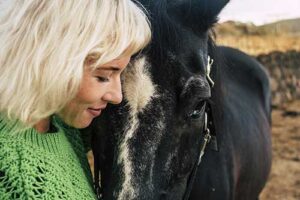Unless you’ve spent time with a horse, it isn’t easy to picture the many benefits of equine therapy for addiction program. Though horses are imposing and formidable in appearance, most are gentle giants who mirror the behaviors of those who care for them.
Additionally, there are multiple benefits to spending time with a horse. These include the bond that horses often develop with individuals. Giving love and feeling loved in return are hugely beneficial to clients in recovery from substance use disorder, emotional issues, and mental health disorders. Horses are not judgmental. They don’t criticize or belittle. Last, they accept and appreciate any love or attention you bestow upon them. For these reasons, horses play major roles in many addiction therapy programs. At United Recovery Project, we believe in the value of holistic therapy to assist individuals in healing from substance use disorder.
What Is Equine Therapy for Addiction?
 Equine therapy has many names, including equine-assisted therapy (EAP), equine-facilitated psychotherapy (EFP), and equine-facilitated mental health (EFMH). They do all, however, involve some therapeutic interaction between a client and a horse. Most equine therapy programs such as these include groundwork only. Therefore, clients don’t actually ride the horses with which they work. Rather, they care for them in the following ways:
Equine therapy has many names, including equine-assisted therapy (EAP), equine-facilitated psychotherapy (EFP), and equine-facilitated mental health (EFMH). They do all, however, involve some therapeutic interaction between a client and a horse. Most equine therapy programs such as these include groundwork only. Therefore, clients don’t actually ride the horses with which they work. Rather, they care for them in the following ways:
- Grooming
- Leading
- Stroking
- Circle work
- Bonding
Horses benefit from the exercise both physically and emotionally. It assists them with dominance issues, challenges them, and helps them overcome certain fears. It also teaches them that someone cares enough to see that they’re exercised and comfortable.
Humans, on the other hand, benefit from these interactions in different ways. An equine therapy program boosts self-confidence and self-esteem. It’s physically and mentally relaxing and helps dispel feelings of anxiety and panic. Last, it encourages empathy and responsibility. Having a horse dependent upon you for basic needs is grounding. It helps clients focus on the here and now instead of worrying incessantly about the past or future.
Until you’ve had the privilege of spending quiet time with a horse, you may not understand the role an equine therapy program plays in addiction recovery.
Uses for Equine Therapy for Addiction Treatment and Rehab Program
Horses are used in many forms of psychotherapy to treat many issues. For instance, returning veterans may work with horses after suffering a traumatic brain injury. Similarly, children with physical disabilities may ride horses to improve muscle tone and coordination. Equine-assisted therapy is a coping strategy used to help heal cognitive damage, lessen the effects of learning disabilities, and help people who struggle with autism better manage stress and anxiety. The horses involved love the attention and the workouts, while the clients who work with them experience a whole range of benefits. It’s a win-win for everyone involved, which is what makes an equine therapy program so successful.
How Does an Equine Therapy Benefit Your Recovery?
Both horses and humans benefit from interacting with one another, but as addiction therapy, this technique offers more advantages than those previously mentioned. For example, clients who take part in equine-assisted therapy for addiction may improve their skills on many levels, including:
- Better understanding how their emotions affect others
- Developing better daily structures and routines
- Gaining a deeper understanding of emotional bonds
- Improving issues with trust
- Learning to have faith in their own abilities to love and be loved
Horses are highly empathetic creatures. They recognize both positive and negative emotions and respond accordingly. It feels good to spend time with a creature that understands when you’re down and responds with love and affection accordingly. This is the biggest advantage of an equine therapy program for addiction recovery.
Discover How United Recovery Project Can Help You Heal
United Recovery Project in offers an equine therapy program to help clients heal from addiction damages. Call today at 888-960-5121 to learn more, or visit us online for admission to our drug and alcohol addiction recovery programs.


